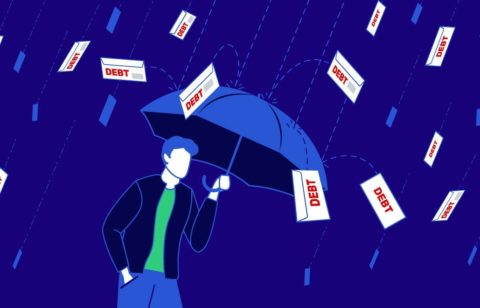Only true romantics think that money doesn’t matter in their relationships, and they’d better pray that their partners agree. Like it or not, money and debt affect almost everything that we do in life, and money issues in relationships can cause serious strain. Acknowledging this fact doesn’t make you shallow or mean that you’d marry someone just for the money; it just means you live in the real world.
Studies have proven repeatedly that economic hardship has a negative effect on happiness in relationships. In fact, money problems are often the first difficulty that a relationship faces. All the love in the world isn’t enough to erase the annoyance of having to cover your partner’s share of the rent. Moreover, if you’re constantly relying on your partner for emergency financial support, the toll on your own feelings of self-esteem and independence can be brutal.
When it comes to debt, these financial problems can be less immediate but no less brutal. If anything, debt can cause larger rifts in a relationship (as opposed to, say, an unpaid phone bill) because it stands a chance to threaten your long-term plans. Sitting on tens of thousands of dollars of debt, whatever the cause, severely impedes your ability to purchase a car, buy a home, and save for the future.
Despite the serious nature of relationship problems caused by it, people often try to hide or ignore debt. If you can make sure that you’re the one who opens your credit card statements, you can probably hide your debt problem for a little while. Still, the truth will come out eventually, so it’s probably a better idea to be proactive and talk about it upfront.
Having the debt conversation can be awkward at best and relationship ruining at worst. That’s why we put together this guide to walk you through it. Follow these tips and you’ll stand a much better chance of constructively discussing your debt problems, figuring out a solution, and becoming a stronger couple because of it.
First things first: Is money really the problem?
Issues with debt and spending are often symptoms of deeper problems in your life or in your relationship. While we don’t know everything about what caused your debt, we can point out some common overspending reasons so that you can get a better grip on why you may have found yourself in debt in the first place.
For instance, psychologists have found that engaging in constant “retail therapy” might indicate a desire for control over your life, especially your emotional state. In an experiment, participants watched a depressing movie clip and then split up into two groups: Choosers and Browsers. Organizers presented both groups with a dozen objects. Choosers could choose what they’d like to buy, while Browsers could only indicate which items would be most helpful when traveling. By virtue of their ability to “choose” (i.e. “buy”) an item, Choosers reported far better moods than Browsers did by the end of the experiment.
In other words, the act of choice allowed them to regain control of their emotional state. It’s the same thing that happens when you go out and buy new things when you’re feeling down. It’s important to recognize how often you are going out and spending.
Of course, overspending might also be because of a lack of discipline in the face of pressures to shop. We constantly face advertisements and exhortations to spend money, with some experts estimating that we encounter upwards of 4,000 advertisements per day. While most ignore many of those ads, that still adds up to a remarkable amount of messaging designed to get you to shop. Combine that with the fact that many people don’t have budgets or significant savings, and that people often turn to credit to avoid the psychological pain of handing over cash, and you can see how easy it is to spend your way into debt.
The important takeaway here is that you probably aren’t just running up your debts because you want stuff. Whether your triggers are emotional, psychological, or circumstantial, you need to understand what may have caused you to have so much debt in the first place. You don’t have to have all the answers at this point, but you should have a general idea.
For the purposes of this article, we’ll assume that the underlying causes of your debt are mainly behavioral and not due to a hardship. While talking about debt is stressful at any time, people are often more understanding when it is caused by medical bills or the loss of a job. If you need guidance beyond those explanations, read on.
Second: Get organized
The next step to dealing with your debt issues is to get organized. You can’t get a handle on your finances unless you know exactly where you stand.
If you don’t have a budget drawn up, then you’re long overdue. Budgets are the building blocks of financial health. They help you to identify spending patterns in the past, figure out what you can afford in the present, and create a debt repayment plan for the future. Without a budget, you can’t have a strategy for getting out of debt.
To make a budget, simply open up a spreadsheet on your computer and tally up your expenses for the month. Some will be fixed and steady (such as your rent) while others will vary (such as your groceries). For the ones that vary, take your best guess, but be careful not to underestimate how much you’ll spend.
Next, tally up your income for the month. If you’re an hourly employee, it might be difficult to land on an exact number, but you should be able to get close.
Finally, subtract your expenses from your income. The money you have left is the money that you can use to start building your future.
Your monthly budget will help you to get a handle on the short term; however, to take control of your long-term financial future, you need to learn to understand your debt. That means opening up a new tab of your budget spreadsheet and listing out each debt, the total amount, the monthly payment date, the eventual payoff date, and the interest rate.
This part can be disheartening, especially right after calculating your budget. If you’re like many people who struggle with debt, you probably have tens of thousands of dollars of outstanding payments left to make and very little left over at the end of each month. However, while it may seem impossible to pay off your debts for good, with hard work and perseverance, you’ll be making financial progress in no time.
This brings us to our next step: talking about all of this with your partner.
Third: Get ready to talk
There are four words in the English language that no one wants to hear: “We need to talk.” Despite that, those words often spur on great progress in relationships. If you’re going to deal with your money issues the right way, you need to talk to your partner about them.
Doing this is, of course, much more difficult than it sounds. Talking about money is awkward in the best of times. Admitting you have a problem with debt can feel like a cruel and unusual punishment for the not-quite crime of spending on credit.
These difficulties amplify if there are other indiscretions you need to admit to on top of the debt. Say you not only struggle with debt, but you’ve hidden your shopping or gambling addiction from your partner for years already. Say you’ve borrowed from your rainy day fund or your savings to cover a down payment for a house just to keep the lie going. Your partner is going to be upset by the fact that you’ve kept things from them, but trust us: the truth needs to come out if you’re really going to make a change.
This is where all your planning comes in handy. You aren’t just coming to the table with your head in your hands, begging for help; you’ve already put in some work. You know how much you owe; you have a budget; you have a basic plan; and you understand (on a basic level) how you ended up in so much debt in the first place. You’re showing that you care about making things right and that you’re willing to work to make a change. That’s huge.
Of course, that doesn’t mean your partner is just going to be okay with everything right away. Give him or her time to process and come to terms with what you’re saying, and then let your partner say what’s necessary in the moment. You’re asking for understanding; but remember, compassion is a two-way street.
Once the dust settles and you’ve both accepted the reality of your debt, you should be ready to do the real work: getting out of debt once and for all.
Fourth: Make a plan, together
You may have gotten yourself into debt on your own, but when you’re in a relationship, getting out of debt is a team effort. You’re not just financially accountable to yourself anymore. With the right attitude and plenty of support, the two of you could be living debt-free lives before you know it.
While the ideal debt repayment plan will vary from couple to couple, there are a few good rules of thumb to keep in mind. The first: make sure that you have regular meetings to assess your entire financial picture and make sure that you’re making good progress toward paying down your debts. Yes, we know this sounds boring, but knowing that you have a financial checkup with your partner once a month will really help to keep you on track and enable you to identify any lingering issues or improvements you can make.
For extra accountability, put your debt repayment goals somewhere highly visible in your home, perhaps on a whiteboard or the the fridge. Write down how many days remain until your projected payoff date and update how much money you still owe every time you make a payment. This simple habit will help you to remind yourself of your goals each day so you can resist slipping up again.
If you have to make changes to your lifestyle in order to keep up with these goals, make sure that you’re including your partner in this plan. Saying to yourself that you’ll quit eating out to save money is good, but if your partner isn’t in the loop, he or she will either tempt you to break that promise or start to wonder why you keep turning down date night. Candidly discuss any changes or sacrifices you plan to make to ensure you’re both comfortable with what’s to come.
Finally, if the strain of repaying your debts becomes too much, or if you feel like you simply aren’t making any progress, don’t bottle that up. Your partner should be a sounding board for ideas, and a shoulder to cry on. Money issues in a relationship are tough, but never forget that you’re in this together, and remember that you have plenty of debt relief options at your disposal.
If you’d like to discuss some of those debt relief options, contact National Debt Relief today to walk through what’s possible with one of our experts. We’re here to help you figure out your best path forward to getting out of debt. Just make sure you talk to your partner before you make any big decisions.





